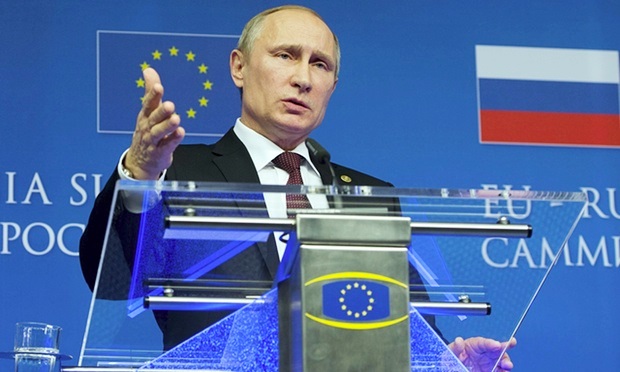By Georgi Gotev
A prominent Russian diplomat has called on the EU to abandon his “messianic” project of exporting democracy and instead solve its problems together with Russia, and not at its expense. Speaking at the Alpbach Forum panel “The EU and Russia: Rivals, Opponents, Partners?” on 31 August, Russia’s Ambassador to the EU Vladimir Chizhov blamed the Lisbon Treaty and the EU enlargement for having contributed to the current paralysis of relations between the EU and its largest neighbour.
In a speech full with historical references, Chizhov said his country had witnessed “with understandable concern” the establishment of “an exclusive ideological underpinning of the European Union”. He reminded delegates that back in May 2013 EU high officials were making it clear that the Vilnius summit of the Eastern Partnership would be about “winning Ukraine” in a “geopolitical battle of Europe”.
He didn’t name any officials, but archives show that such a statement has indeed been made by Lithuania’s foreign minister Linas Linkevicius, when his country was holding the rotating EU presidency. “This was clearly a wrong approach. Ukraine should have never been viewed as a geopolitical playground,” Chizhov said, adding that the economically fragile and ethnically diverse country needed instead a common national identity, sufficiently ample to embrace all ethnic and linguistic groups inhabiting the country.
“But for such an identity to take root, time, stability and good relations with both the EU and Russia are of essence. This must be clearly understood,” the Russian diplomat said. In his words, the internal transformation of the EU following the ‘big bang’ expansion of 2004 and the subsequent Lisbon Treaty reform, resulted in narrowing the flexibility of EU’s positions in the international arena.
“In other words, the price for ‘speaking with one voice’ has been the lowest common denominator of the resulting message,” Chizhov said. He didn’t spell it out, but in the context of the Ukraine crisis it has become obvious that the most hawkish countries in the EU are among its new members, especially Poland and Lithuania.

Regarding the Lisbon Treaty, Chizov said, “The inward-looking peace project has acquired a new somewhat messianic dimension the EU now ‘seeks to advance in the wider world… principles which have inspired its own creation’ (Art. 21 TEU). The question is, however, whether this ‘export of democracy’ is consistent with the objective of maintaining peace inside and beyond the European continent, or the European Union will have to make a hard choice between the two.”
The Russian diplomat criticised EU’s aspiration to become a regional “normative power”, which in his words implied the growing projection of the EU acquis to its relations with third countries. He mentioned in this context the “Third Energy Package” and the EU Emission Trading Scheme.
The million-euro question
Chizov said the “million-euro question” was how to develop the EU-Russia relations into a win-win situation for both parties, and then provided an answer. First of all, he said that the relationship should become “a genuine partnership of equals, ensuring that mutual concerns are systematically and thoroughly addressed”. In this respect, he called on the EU to look at Russia’s regional project, the Eurasian Economic Union, as its counterpart.
“For a start, it would be expedient to set up initial working contacts between the European and the Eurasian Economic Commissions. It is welcoming that many within the EU are finally coming round to this idea,” the diplomat said. Secondly, Chizov said, economic cooperation between Russia and the EU needs to be strengthened, not weakened. He quoted figures produced by the Austrian Institute of Economic Research (WIFO) according to which the restrictive measures against Russia are set to cost the EU as much as €100 billion and more than two million jobs.
“This, in my view, is hardly what the EU needs in the current volatile economic environment”, he said. Thirdly, the relationship must become less ideological and more pragmatic, the Russian diplomat said. He quoted Otto von Bismark, the Prussian statesman who dominated German and European affairs from 1860 until 1890, who had said that one should either deal with the Russians in a fair way, or not at all.
Finally, Russia and the EU need to jointly deal with the manifold crises unfolding in their common neighbourhood, Chizhov said. “In the Russian view, which, I understand, may not be universally shared by this audience, the disastrous turn of events in the region of the so-called ‘Arab spring’ as well as in Ukraine has a lot to do with the attempt to inject the notion of supremacy of Western values into highly complex regional environments. “Certainly, the EU alone can hardly be blamed for regional instability. Nevertheless, the European Neighbourhood Policy, in my view, was not made any more attractive by the heavy-handed manner in which the EU sought to ‘civilise’ the region and impose its own norms and standards there”, Chizov said. He didn’t mention the USA by name in his speech. Faced with the problems of terrorism, illegal migration, drug and human trafficking, Russia and the EU should make use of the channels of communication established, which have been largely closed in the context of the Ukraine crisis, Chizhov said, adding: “while Russia and the EU severely limited their cooperation, the terrorists did not”.
Courtesy ‘EurActiv’







